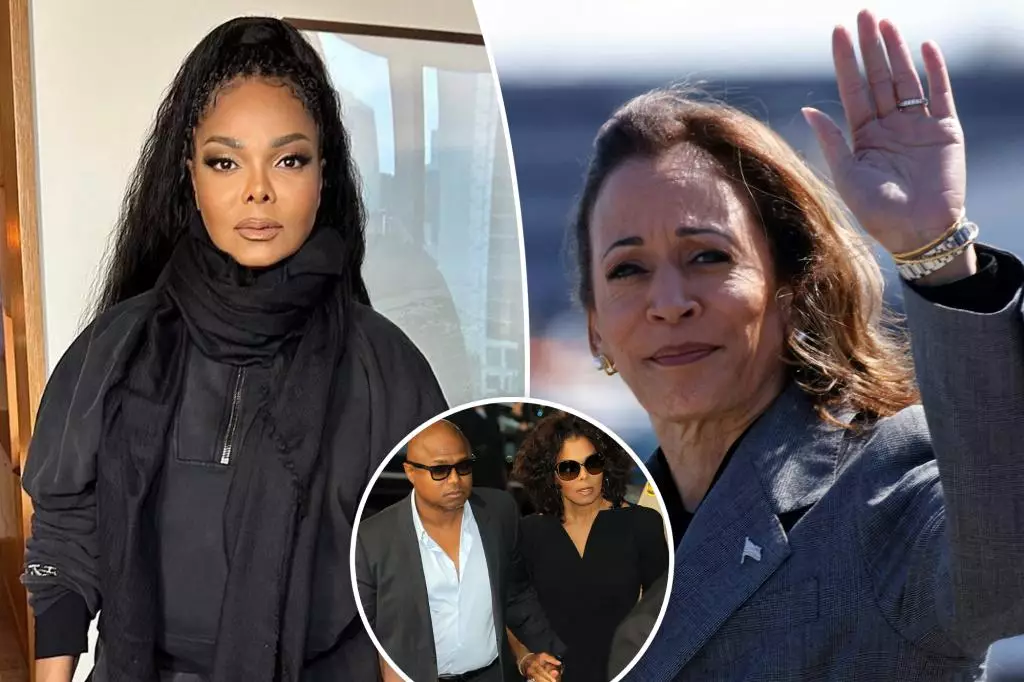Janet Jackson has long been a figure synonymous with empowerment, expression, and artistic autonomy. Her anthem “Control” encapsulated her journey of reclaiming her narrative and identity in an industry often defined by outside influences. However, recent events have thrown her ability to maintain such control into question, revealing a complicated reality marred by familial dynamics and public scrutiny. This article examines the implications of Janet’s recent comments regarding Vice President Kamala Harris, the ensuing public backlash, and the concerns regarding management choices within her inner circle.
The Context of Controversy
At the heart of the current controversy is Janet’s unexpected commentary on Harris during an interview published by the Guardian. When asked about Harris being the first black female president, Janet’s response sparked immediate outrage: she questioned Harris’s racial identity, suggesting that her lineage was not as straightforward as widely understood. This remark was particularly jarring considering Harris’s significant representation as both a black and South Asian woman in office.
The backlash was not just an isolated incident; it reverberated throughout social media, leading to swift condemnation from prominent figures, including comedian DL Hughley, who criticized the singer’s remarks and hinted at an irony in her questioning racial identity while having undergone various physical changes through surgery. The intense criticism faced by Janet reflects a broader cultural expectation placed upon celebrities, particularly those who have championed progressive social issues.
As public reactions spiraled, insiders began to focus attention on Janet’s inner circle—particularly her brother Randy Jackson, who is her manager. Sources indicate discord regarding his management capabilities, suggesting that his influence has contributed to the missteps surrounding the interview. Critics argue that his inexperience in handling such public relations disasters has become a detrimental factor for Janet, particularly at a time when her carefully cultivated image is at stake.
Moreover, reports indicate that Janet’s distance from current events has left her vulnerable to poor guidance. Living in a “bubble” in London and reportedly disengaged from news consumption, her reliance on Randy means that she might be absorbing a distorted or incomplete perception of public sentiment. This detachment can lead to misguided public statements, which may have ramifications that extend beyond mere public opinion, enduringly affecting her legacy.
Compounding the controversy was the fallout from a confusing management situation. A man named Mo Elmasri, claiming to manage Jackson, issued a haphazard apology on her behalf. Only later did Janet’s publicist clarify that he had no official ties to her management team. This muddled scenario only fueled the narrative of disorganization within Janet’s camp, leaving many to question who truly holds sway over her decisions.
Allegations that Randy facilitated Elmasri’s appearance in the picture further muddied the waters. Trusted sources within Jackson’s circle expressed doubt about both Randy’s judgment and the credibility of those he surrounds himself with. Critics argue that his lack of savvy could potentially sabotage Janet’s longstanding legacy, highlighting the tension between familial loyalty and professional competence.
Adding to the complexity of the situation is Janet’s long-delayed album, “Black Diamond,” which she announced prior to the pandemic. During the Guardian interview, she indicated that much of her recorded work remains unpublished and that Randy is “waiting for the opportune time” for release. But sources have also indicated that she lacks sufficient material for a full album. This raises critical questions about the creative process and the potential implications Randy’s management choices are having on Janet’s artistic trajectory.
The perception that Janet is unproductive or out of touch with her musical capabilities damages her brand as a resilient artist. Fans who have historically viewed her as a pioneer may begin to feel disillusioned or question her commitment to her craft. Janet’s hesitance to bring forth new music, combined with her controversial statements, creates a dual narrative that could affect her future viability in the industry.
In a world where public personas can shift with a single statement, Janet Jackson stands at a crossroads. The future of her career and her legacy may hinge upon her reevaluation of control—not just over her artistic output, but also over the influences that guide her public image. As she prepares for concert tours and potential future projects, paying critical attention to these factors may determine whether she retains her role as an icon of empowerment or becomes embroiled in further controversy. Ultimately, the question remains: can Janet reclaim her control, or will the challenges surrounding her begin to define her narrative in an unforgiving public arena?


Leave a Reply